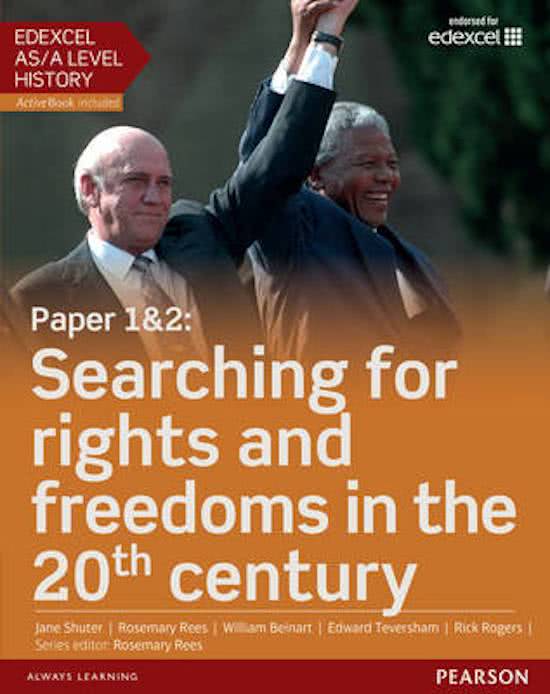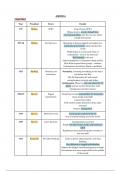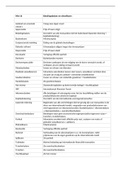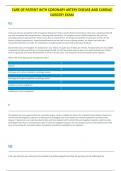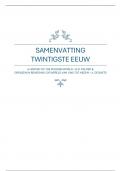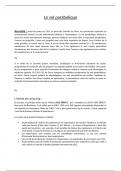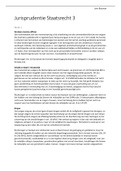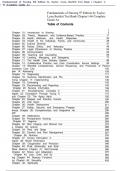AMERICA
CHAPTER 1
Year President Event Details
1917 Wilson WW1 Took US into WW1
Wilson tried to involve himself into
international affairs after the war too which
people did not like
1919-20 Wilson First Red scare Monarchy in Russia toppled and replace by a
communist government which shocked the
world
People began to accuse each other of
communism - seen as ‘un american’
‘Red hunting’ broke out
Sacked employees of communist ideals and Ku
Klux Klan targeted these groups - violence
Communism was the key blame to problems
1921 Harding Normalcy and Normalcy: returning everything to the way it
Isolationism was before the War
But the depression hit and caused
unemployment, protests and strikes
Isolationism: Meant to only care about the US
affairs and not involve themselves with
immigrants and other nations
1928/29 Hoover Rugged People had to take responsibility for themselves
Individualism (poor people especially)
Laissez faire policy
USA need to isolate themselves from other
countries
Restrict immigration
1929 Hoover Wall Street Crash Stock market crashed in the US
Out of control trading across the world
1929 Hoover Great depression Unemployment occurred
People lost their homes, banks and businesses
failed
Republicans favoured leaving the economy to
sort out itself
1933 Roosevelt New Deal Thinking Came to power and promised a new deal
thinking
Very different to rugged individualism
Balance the budget (introduced agencies to help)
Government was more responsible to the welfare
of the people
, 1939 Roosevelt WW2 Hauled USA out of the depression
Geared up the USA up for war production
Led to rise in employment as more people
involved in production of war goods
‘Lend-lease scheme’ - lending Britain supplies to
be returned after the war
1941 Roosevelt Japanese attack on Japan intended the attack as a preventive action
US at Pearl Aim was to prevent the United States Pacific
Harbour Fleet from interfering with its planned military
actions in Southeast Asia against overseas
territories of the United Kingdom, the
Netherlands, and those of the United States.
1945 Roosevelt WW2 Ends Produced $47 billion worth of war goods
War was good for the economy
Human cost was high though
1947 Truman Cold War Soldiers of the Soviet Union and the United
States did not do battle directly
Began decades long struggle for supremacy
The two superpowers (Truman and Stalin)
continually antagonised each other
Truman in ‘Truman Doctrine’ followed by
Marshall plan - a system to aid war-torn
countries, to prevent their takeover by
communist
Nuclear defence: USSR had nuclear capability
and the US seemed to be preparing for nuclear
attack.
The arms race: holdings of atomic bombs rose
in the US. USSR began to make atomic bombs
too and cost both countries a lot of money
resulting in stockpiling nuclear weapons to cause
devastation (Mutually Assured Destruction)
Armed services: creation of military force
affected domestic economy (cost money to run
but provided employment)
The space race: the next war could be won from
space. USSR launched first spacecraft into space
but US then put the first man on the moon
Cold war created divide between democrats and
republicans and hawkes and doves across all
political boundaries
1947-54 Truman Second Red Scare Communist scare again
USSR was spying on the US to get hold of atomic
, weapons
Chinese Government was seen as corrupt as they
became communist
Media questioned whether government was
doing enough to fight communism and protect
its citizens
Joseph McCarthy headed SRS
Made an anti communist speech and said he had
names of 205 communists working in state
department (didn't actually have list when asked
to show it)
Gathered support for his assertion and next day
revised number of 57 communists
Even though he had muddled numbers up, he had
a lot of support
Tydings Committee (setup to investigate charges)
said McCarthy accusation were half truths and
half lies
Had support till he investigated army, they were
televised (20 million saw) and his treatment of
people were unreasonable so he lost support
Red scare died down
Led investigated suspected communists
FBI given more power to investigate people and
people lost their freedom of speech
Anti communist hate
1950-53 Truman Korean War Communist North Korea invaded
non-communist South Korea in the context of
the red scare
26,000 troops and war was led by an MacArthur
to defend South Korea because they didn't want
to look as if they are “soft on communism”
Korea emphasises the cold war had shifted away
from domestic policy towards international
policy
Truman did not inform media of what was
happened, rumours spread - decline in
confidence of presidency to nation
1957 Eisenhower USSR put a satellite Without the cold war, Congress would be been
into space unlikely to propose a space satellite
USSR put a spacecraft first
1960 Kennedy Liberalism, Liberalism - Concerned for the welfare of
CHAPTER 1
Year President Event Details
1917 Wilson WW1 Took US into WW1
Wilson tried to involve himself into
international affairs after the war too which
people did not like
1919-20 Wilson First Red scare Monarchy in Russia toppled and replace by a
communist government which shocked the
world
People began to accuse each other of
communism - seen as ‘un american’
‘Red hunting’ broke out
Sacked employees of communist ideals and Ku
Klux Klan targeted these groups - violence
Communism was the key blame to problems
1921 Harding Normalcy and Normalcy: returning everything to the way it
Isolationism was before the War
But the depression hit and caused
unemployment, protests and strikes
Isolationism: Meant to only care about the US
affairs and not involve themselves with
immigrants and other nations
1928/29 Hoover Rugged People had to take responsibility for themselves
Individualism (poor people especially)
Laissez faire policy
USA need to isolate themselves from other
countries
Restrict immigration
1929 Hoover Wall Street Crash Stock market crashed in the US
Out of control trading across the world
1929 Hoover Great depression Unemployment occurred
People lost their homes, banks and businesses
failed
Republicans favoured leaving the economy to
sort out itself
1933 Roosevelt New Deal Thinking Came to power and promised a new deal
thinking
Very different to rugged individualism
Balance the budget (introduced agencies to help)
Government was more responsible to the welfare
of the people
, 1939 Roosevelt WW2 Hauled USA out of the depression
Geared up the USA up for war production
Led to rise in employment as more people
involved in production of war goods
‘Lend-lease scheme’ - lending Britain supplies to
be returned after the war
1941 Roosevelt Japanese attack on Japan intended the attack as a preventive action
US at Pearl Aim was to prevent the United States Pacific
Harbour Fleet from interfering with its planned military
actions in Southeast Asia against overseas
territories of the United Kingdom, the
Netherlands, and those of the United States.
1945 Roosevelt WW2 Ends Produced $47 billion worth of war goods
War was good for the economy
Human cost was high though
1947 Truman Cold War Soldiers of the Soviet Union and the United
States did not do battle directly
Began decades long struggle for supremacy
The two superpowers (Truman and Stalin)
continually antagonised each other
Truman in ‘Truman Doctrine’ followed by
Marshall plan - a system to aid war-torn
countries, to prevent their takeover by
communist
Nuclear defence: USSR had nuclear capability
and the US seemed to be preparing for nuclear
attack.
The arms race: holdings of atomic bombs rose
in the US. USSR began to make atomic bombs
too and cost both countries a lot of money
resulting in stockpiling nuclear weapons to cause
devastation (Mutually Assured Destruction)
Armed services: creation of military force
affected domestic economy (cost money to run
but provided employment)
The space race: the next war could be won from
space. USSR launched first spacecraft into space
but US then put the first man on the moon
Cold war created divide between democrats and
republicans and hawkes and doves across all
political boundaries
1947-54 Truman Second Red Scare Communist scare again
USSR was spying on the US to get hold of atomic
, weapons
Chinese Government was seen as corrupt as they
became communist
Media questioned whether government was
doing enough to fight communism and protect
its citizens
Joseph McCarthy headed SRS
Made an anti communist speech and said he had
names of 205 communists working in state
department (didn't actually have list when asked
to show it)
Gathered support for his assertion and next day
revised number of 57 communists
Even though he had muddled numbers up, he had
a lot of support
Tydings Committee (setup to investigate charges)
said McCarthy accusation were half truths and
half lies
Had support till he investigated army, they were
televised (20 million saw) and his treatment of
people were unreasonable so he lost support
Red scare died down
Led investigated suspected communists
FBI given more power to investigate people and
people lost their freedom of speech
Anti communist hate
1950-53 Truman Korean War Communist North Korea invaded
non-communist South Korea in the context of
the red scare
26,000 troops and war was led by an MacArthur
to defend South Korea because they didn't want
to look as if they are “soft on communism”
Korea emphasises the cold war had shifted away
from domestic policy towards international
policy
Truman did not inform media of what was
happened, rumours spread - decline in
confidence of presidency to nation
1957 Eisenhower USSR put a satellite Without the cold war, Congress would be been
into space unlikely to propose a space satellite
USSR put a spacecraft first
1960 Kennedy Liberalism, Liberalism - Concerned for the welfare of

